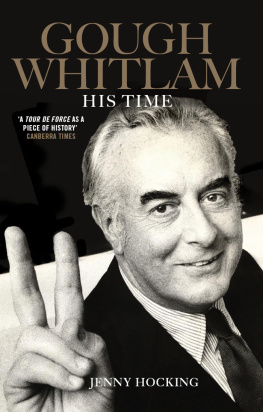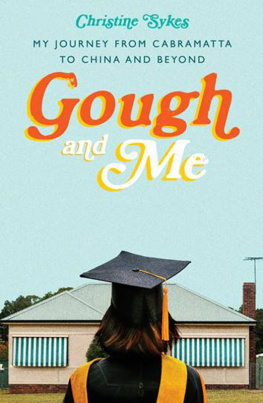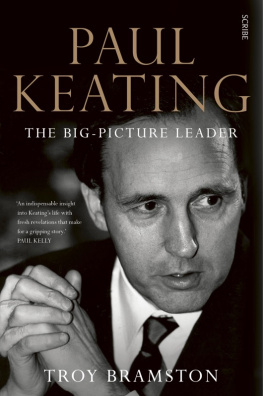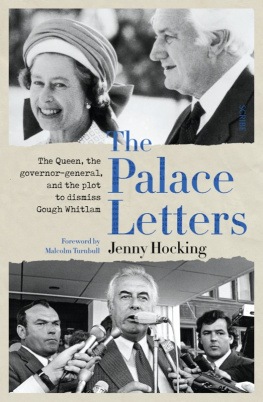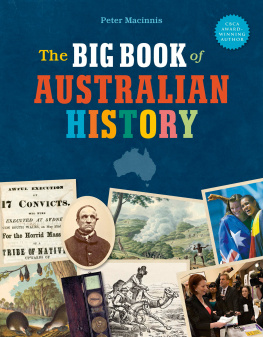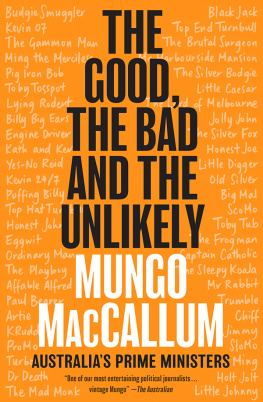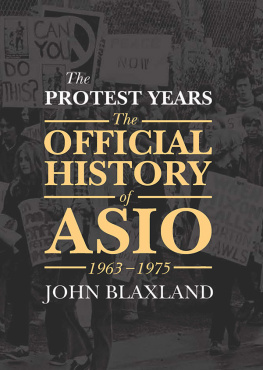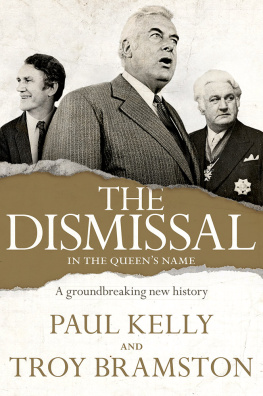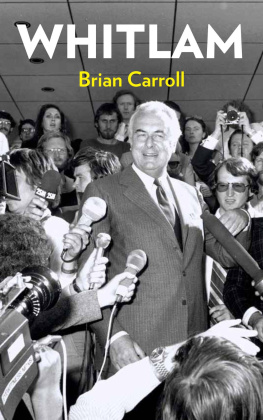The Miegunyah Press
The general series of the
Miegunyah Volumes
was made possible by the
Miegunyah Fund
established by bequests
under the wills of
Sir Russell and Lady Grimwade.
Miegunyah was the home of
Mab and Russell Grimwade
from 1911 to 1955.
Selected extracts from reviews of Gough Whitlam: His Time
Fascinating portrait of the Whitlam years.
Troy Bramston, The Australian, 26 January 2013
Professor Jenny Hockings remarkable second volume of her Gough Whitlam biography [has] enough fresh material and new angles to keep alive the intrigue with this period of our history, even for the aficionados. Hocking provides a comprehensive unveiling of the role of the High Court judge, friend of the governor-general, and later chief justice, Sir Anthony Mason, as an adviser to the desperately insecure and needy Sir John Kerr.
Richard Ackland, Sydney Morning Herald, 31 August 2012
A fascinating and important account and a tour de force as a piece of history.
Associate Professor Frank Bongiorno, ANU Canberra Times, 9 October 2012
It is quite a shocking thing to read afresh the absolute political brutality of the dismissal In one of the most impressive sections of Hockings book, she analyses the concerted conservative strategy to delegitimise the Whitlam government in order to create a sufficient climate of crisis to either force the government to the polls or, as indeed it turned out, to induce the governor-general who replaced Hasluck, John Kerr, to dismiss the government.
Kevin Rudd, Prime Minister of Australia 20072010
Hocking creates a rounded portrait of a complex and flawed idealist her picture of Whitlam makes his governments wild ride seem entirely appropriate to the times and even more exciting in retrospect.
Short Takes, Herald Sun, 10 November 2012
There is no better account of how the triumph of 1972 turned into the catastrophe of 1975.
Neal Blewett, Australian Book Review, November 2012
Its time to hand Jennys book over to the Australian people for them to draw their own conclusions.
Hon. Gough Whitlam
GOUGH
WHITLAM
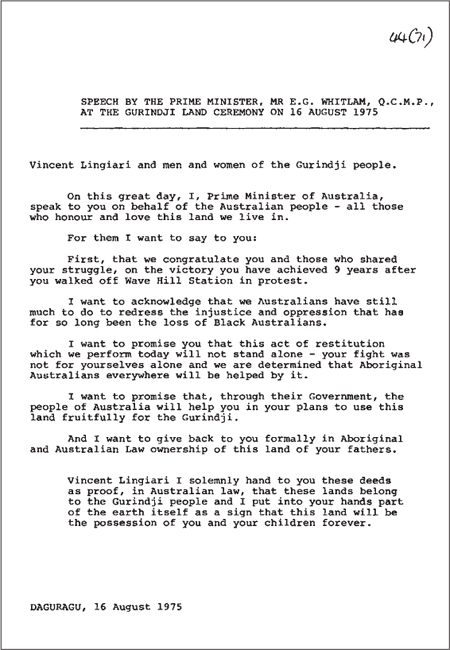
GOUGH
WHITLAM
HIS TIME
THE BIOGRAPHY
VOLUME II
JENNY HOCKING

THE MIEGUNYAH PRESS
An imprint of Melbourne University Publishing Limited
1115 Argyle Place South, Carlton, Victoria 3053, Australia
mup-info@unimelb.edu.au
www.mup.com.au
First published 2012
This edition published 2013
Text Jenny Hocking, 2012
Design and typography Melbourne University Publishing Limited, 2013
This book is copyright. Apart from any use permitted under the Copyright Act 1968 and subsequent amendments, no part may be reproduced, stored in a retrieval system or transmitted by any means or process whatsoever without the prior written permission of the publishers.
Every attempt has been made to locate the copyright holders for material quoted in this book. Any person or organisation that may have been overlooked or misattributed may contact the publisher.
Page iv: EG Whitlam, speech to the Gurindji people, upon the handing over of the deeds to the land of the Gurindji people, 16 August 1975. Courtesy of the Whitlam Institute.
p. 196: Blue Sky Mine Sony/ATV Music Publishing LLC
p. 324: Cant Stand Me Now by P Doherty/C Barat/M Hammerton 2004 Rough Trade Music Ltd, EMI Music Publishing Ltd. For Australia and New Zealand: EMI Music Publishing Australia Pty Limited (ABN 83 000 040 951) PO Box 35, Pyrmont, NSW 2009, Australia. International copyright secured. All rights reserved. Used by permission.
Edited by Susan Keogh
Designed by Phil Campbell
Typeset in Janson Text by TypeSkill
Printed in Australia by McPhersons Printing Group
National Library of Australia Cataloguing-in-Publication entry
Hocking, Jenny.
Gough Whitlam: his time. Volume 2 / Jenny Hocking.
9780522864298 (pbk.)
9780522862157 (ebook)
Includes bibliographical references and index.
Whitlam, Gough, 1916
Australian Labor PartyHistory20th century.
Prime ministersAustraliaBiography.
Social changeLaw and legislationAustralia.
Social changePolitical aspectsAustralia.
AustraliaPolitics and government.
320.99406

This project has been assisted by the Australian Government through the Australia Council, its principal arts funding and advisory body.
My experience in politics is that when nothing is controversial, when everything is beautifully co-ordinated, it must be that nothing is changing.
Gough Whitlam
13 February 1987
CONTENTS
1
WERE IN
The early days of the Whitlam Government would rival the 100 days of President Roosevelt in its scope and initiatives. There will be a flow of legislative and administrative activity unparalleled in the history of national government in Australia.
Lance Barnard
ROOM 7 OF the Cabramatta Sunnybrook Motel was crowded, hot and noisy, bristling with expectation. Four television sets carried the same live image of the national tally room in Canberra, while seven white telephones brought insistent updates from Labor Party scrutineers. concede defeat in a landslide result for Labor. With Margaret, his advisers, office staff and campaign workers around him, Whitlam left the Sunnybrook Motel and walked back up the hill to Albert Street, past the hundreds of supporters along the street chanting Gough, Gough, Gough, to join the party members, neighbours and jubilant family members at the packed election night barbecue in their Cabramatta backyard.
A remarkable scene greeted him as he entered the modest Albert Street house, surging with people streaming in to celebrate, to watch the tally on the television sets scattered around the garden, to see Gough Whitlam. Hundreds of chanting, cheering party-goers rushed towards him and in between the crush of ecstatic supporters, the eager journalists, the jostling camera crews engaged in a fist-fight over prime position and the sheer mayhem of victory, Margaret kissed him: Darling, weve made it. At 11.30 p.m., a tired but delighted Gough Whitlam climbed a three-metre-high scaffold temporarily erected in the backyard and, perched above the willing crowd, sweat pouring from the heat of the camera lights above, gave his first televised public address as Prime Ministerelect: It is a magnificent victory. The Government will have a mandate from the people to carry out all its programmes Tomorrow is the first Sunday in Adventthe advent of the first Labor Government in 23 years.
Whitlam had led the Australian Labor Party into government for the first time in twenty-three years, but more than that, he had led it out of Opposition and into government from an election for the first time in forty-three yearsan achievement not matched since Jim Scullin took Labor to victory in 1929 over the sitting BrucePage government. Whitlams victory was more marked, more closely identified with the ideas and determination of Whitlam himself, for his having done so in less than six years as leader. The victory was all the more remarkable for his bringing the Labor Party back, in that The swing was not uniform, being strongest in Tasmania where Labor won all five seats, and against the party in Western Australia. But two aspects of it gave Whitlam the greatest personal satisfaction: the partys support from the new outer suburbs of Melbourne and Sydney; and, secondly, the substantial swing to Labor in Victoria. The branch that had for years been his greatest obstacle to victory was now his vindication.

